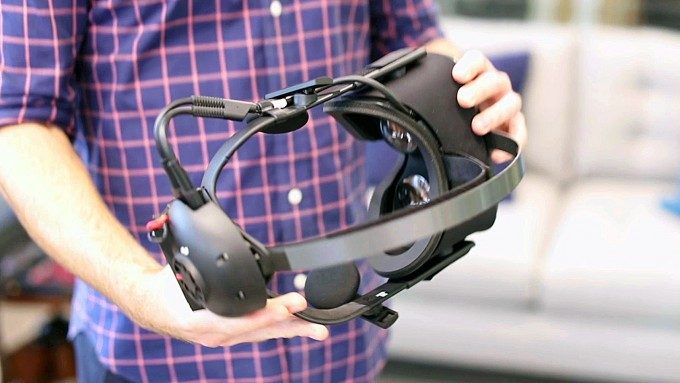
Oculus is reportedly readying a Quest successor which will iterate on the existing headset with a smaller form-factor, faster refresh rate, and new controllers. Rather than an outright Quest 2, it seems Oculus may be aiming first for a Quest S.
According to a Bloomberg report citing unnamed sources, Oculus is testing multiple new iterations of Quest and had plans to launch the headset in late 2020, though the Coronavirus pandemic could push the headset back to 2021.
The source told Bloomberg that some versions of the Quest successor are 10% to 15% smaller than the existing Quest and lighter too. Some of the weight could be cut by removing Quest’s fabric accents and redesigning the headstrap to be lighter, they said. Oculus has previously shown prototype headsets with significant improvements in form-factor, but that tech is likely won’t leave the lab for some time.
Additionally it was said that the next Quest would have a higher refresh rate of at least 90Hz, potentially up to 120Hz, which is higher than the headset’s current 72Hz. A faster refresh rate means smoother and more comfortable motion in the headset, but is likely to demand more performance.
Oculus has previously said that the current Quest’s displays are technically capable of 90Hz, but the company would have to re-certify the headset with regulatory bodies if they wanted to change that after the fact, something they were unwilling to do. Given that at least some iterations of the Quest successor reportedly use a 90Hz display, it’s possible that the new headset would still use the same displays as current.
If 120Hz, we’d expect this would be a new display entirely, and also that such a high refresh rate would require an upgrade from the current Qualcomm 835 processor in Quest to something more powerful, unless Oculus opted to do something like interpolate 60 FPS to 120Hz (similar to PSVR).

The source told Bloomberg that Oculus is working on a redesigned controller for the headset to fix the issue of the battery cover sliding off during vigorous use; the controller would reportedly be backwards compatible with the current Quest (and thus likely with the Rift S as well). Some of the Quest iterations being developed retain an IPD slider like the current headset, they said.
The source also noted that the new Quest model would continue to support Oculus Link, allowing the headset to tether to PCs to play high-end VR games.
With what’s been reported so far, it sounds very much like this won’t be a Quest 2, but rather a ‘Quest S’ which would continue to be compatible with all existing Quest content. Some three years after the company’s first PC VR headset, the Rift, Oculus opted to release a Rift S last year rather than a Rift 2. The Rift S was less expensive than the original Rift and focused mostly on convenience features over improvements in hardware and performance.
Quest was originally released in May 2019, and if a Quest successor was in fact planned for 2020 it would be a very fast turnaround compared to existing precedent.
As mentioned, it was three years between the Rift and the Rift S. It was roughly the same amount of time between the original HTC Vive and the company’s next consumer-focused headset, Vive Cosmos. Sony meanwhile launched its PlayStation VR headset in late 2016 and still hasn’t revealed a next-gen headset, though it has all but confirmed that it’s coming eventually.
The Bloomberg report indicates, however, that the Coronavirus pandemic may have pushed that aggressive refresh of Quest from late 2020 and into 2021.
The post Oculus Quest Successor Reportedly Being Readied with Faster Refresh Rate, New Controllers appeared first on Road to VR.
Ream more: https://www.roadtovr.com/oculus-developing-s-quest-2-successor-report/
No comments:
Post a Comment